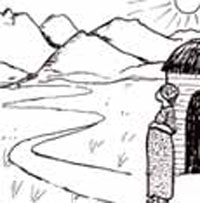4.1.1 Barriers to facility-based postnatal care
Before you introduce a postnatal care (PNC) service in your community, you should first know about the barriers and fully understand why home visits remain the optimum PNC service delivery method in rural communities. The most important barriers hindering facility-based postnatal care are:

- Social and cultural barriers: The tradition of keeping mothers and newborn babies indoors for a few days after the birth in a period of seclusion, and certain community rituals during this period, hinders mothers from going to health facilities for PNC. You should gradually explore these barriers in your locality and work together with the community leaders to change these practices.
- Geographic barriers: Walking across mountains, crossing rivers without bridges during the rainy season, and lack of roads, are some of the geographical barriers that hinder mothers from accessing health facilities for PNC (Figure 4.1).
- Physical access: Even though some mothers would prefer to go to a health facility, the nearest health centre or hospital is not within a reachable distance on foot or with available transport.
- Financial barriers: In Ethiopia, health services for labour and delivery and postnatal health services are considered to be free of charge, but in reality families have to pay for transport for the woman to the health facility, and for consumables including drugs and surgical gloves. These extra costs remain a major barrier to facility-based care.
- Quality barriers: After reaching the health facility, the mother and newborn may not get the expected quality of PNC service because of lack of adequately trained health workers, or shortages of equipment or drugs. Poor quality services reduce confidence in other mothers in the community, who are less likely to make the effort of going to the health facility.
An important secondary target for your PNC visits is to explore some of the social and cultural barriers mentioned above and work with community leaders to try to change these. Study Session 1 of this Module described a number of ways in which you might do this. Thinking back to that, now write a short action list of things you would try to do.
There are many things you might have included. Go back to Study Session 1, Section 1.6, and compare your answers with the ideas put forward there.
4.1 Home visits: the best opportunity to provide postnatal care
